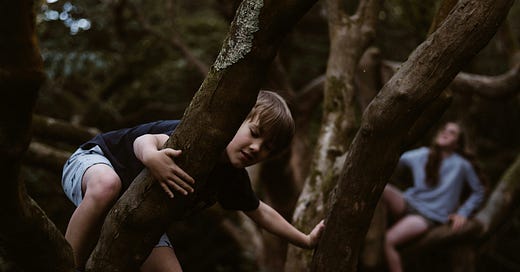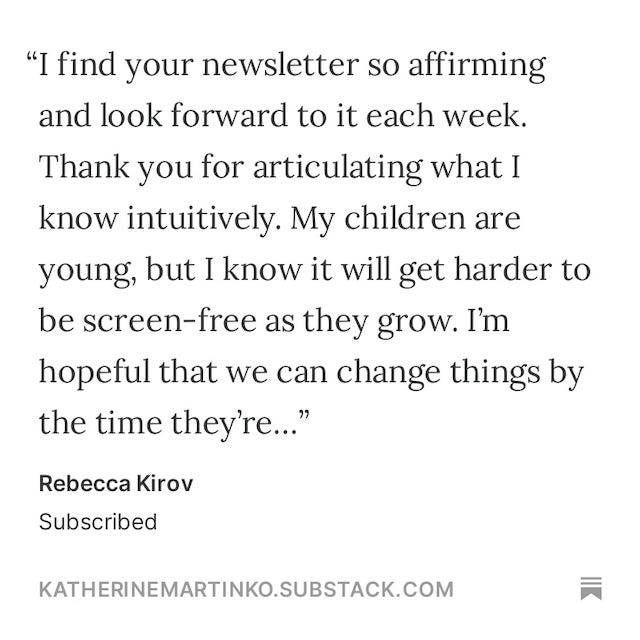What Is the Purpose of Childhood?
These years are fleeting, yet formative. Don't squander them.
Another summer weeknight, another soccer game. Last night, I spent two hours sitting on the bleachers at the local field, watching my sons play soccer—and sneaking peeks at the people around me. It was fascinating to watch the contrast between two pairs of preteen girls, around age 11 or 12.
One pair sat hunched over a phone. I could hear them discussing another girl and something she’d posted that the two girls beside me disapproved of. They analyzed the post at great length, looking up occasionally at the game, but staying mostly focused on the phone.
Nearby, two similarly aged girls played on a blanket. They did not have phones that I could see. One girl rolled the other up in a smaller blanket, turning her into a tightly bound sausage. I heard them describe her as a banana, as she rocked back and forth in a kind of hollow hold. Then the banana flipped over and attempted moving across the grass, facedown with no arms. “I’m an inchworm!” she shrieked delightedly. Both girls laughed at the goofiness, and I couldn’t help smiling either.
The contrast between the two pairs of girls was striking, and I couldn’t help feeling that one was having a much better time than the other. Not just better in the sense of more fun, but also in terms of health. The banana-inchworm game was far more aligned with what young girls should be doing on a summer evening on a bed of lush grass, and I suspected those two would go home feeling more satisfied and happy than the pair scrolling on social media.
It got me thinking: What is the purpose of childhood? It sounds like such a grandiose thought, almost like, “What is the meaning of life?”, and yet I think that many parents would do well to consider it more deeply and frequently.
There is an inevitability to childhood that’s as much a relief as it is disconcerting. You introduce a baby to the world, and they’ll grow up, no matter what. There’s nothing you can do as a parent to stop it once that ball gets rolling. But there are decisions and influences that will slow down or speed up a child’s experience of childhood, either enriching or diminishing it as the years march onward. And before you know it, you’ll reach the end and realize just how fleeting yet formative those years were.
What should a child be doing?
Childhood is rehearsal for adulthood through play. It’s a chance to pretend and practice many of the actions that children see adults engaging in all around them, but within a play-based setting. That’s why it is so important for children to have plenty of opportunities for active, creative free play with others. They will make up games that help them make sense of the world they’re observing.
Childhood is a chance to take low-stakes risks. Kids should be pushing the boundaries of their physical bodies, their emotional selves, and their mental abilities, testing themselves (and others) to see what they’re capable of. It’s better to get some of that thrill-seeking tendency out of a kid’s system than waiting until they’re a full-grown adult. That’s why I fight the urge to intervene when my teenage son does backflips off the dock into the lake or the middle one climbs higher than our house in the spruce tree.
All of this builds confidence, and it’s a chance to make mistakes without high social cost. For instance, it’s far better for a child to get kicked out of a group game for being rude than have that happen on the first day of a new job, right out of school.
Childhood gives children a sense of belonging. It instills within them a deeply rooted sense of where they come from, who their family is, and what matters in life. It's a time to establish lasting relationships with family and friends. Daily routines are an opportunity to impart important priorities to children, such as sitting down to eat dinner together every night, getting plenty of sleep, being active, studying consistently, speaking respectfully, etc.
Beyond the family home, childhood is an opportunity to connect children to their communities and local culture. With so much online content coming from all over the world, with no apparent relevance to the places we live and come from, this is more important than ever. Children benefit from secure attachments of all kinds, including feeling like they belong in and to a specific place and know it well—another reason why they should be given more freedom to roam and navigate independently.
Childhood is a chance to learn practical life skills. You’ve only got 18 years or so to teach a child to function independently as an adult, and training for that essentially begins at zero. Kids don’t wake up at 18 suddenly knowing how to talk to strangers, get from point A to point B on their own, manage school assignments independently, earn money, or cope with the ups and downs of life. It takes repeated practice over years to build those skills.
Childhood is a time to have fun. Creative, playing children become familiar with the sensations of wonder, awe, and joy. Those are beautiful, addictive feelings, and kids will continue to seek them out as they grow. I do believe we adults generally need to have more fun, too, partly as an antidote to stress, but also to make the most of the fleeting years we have on this Earth. Knowing how to enjoy ourselves starts with an attitude instilled in childhood—and our own kids can help us to reconnect with fun, too.
(Coincidentally, as I wrote these words, my youngest child danced into the room with a battery-powered birthday card that blasts music and features gyrating hamsters at a disco. This card is an endless source of delight to my children, who have played it steadily for the past 8 months. He danced enthusiastically, I joined in briefly, and now he has left. I can’t help smiling. Case in point: Kids create fun at the most random times.)
Childhood is a chance to teach kids just how wonderful the real world can be. These few years are a chance to keep them offline, to stave off the inevitable technological creep that will happen in coming decades, to stuff them full of wonderful analog memories, games, conversations, and experiences that will form the foundation of their very beings. We parents have a responsibility to help our kids build lives that do not require social media for entertainment or validation; and I truly believe that if we can do that throughout their childhood and adolescence, we’ll be sending them off into the world with a great advantage.
That’s a whole lot of early-morning philosophizing for what’s essentially a simple message: More banana-inchworm games, less social media.
You Might Also Like:
Designing for Offline Play
Let Them Have Silence
It’s Hard to Be THAT Parent
’Oppenheimer’ Composer Thanked Parents for Giving Him Guitars, Not Video Games
Interesting News Stories:
‘We wanted to change the norm on smartphone use’: Grassroots campaigners on a phone-free childhood (The Guardian)
If you care about someone, show them—and put away your phone (The Guardian)
I cured my pre-teens’ tech addiction on a Survivor-style camping trip (The Telegraph)
Thank You, Subscribers!
I’d like to thank the subscribers who have upgraded recently to paid subscriptions, despite all content remaining free and accessible to all. This note from a new paid subscriber was absolutely delightful to read and makes all the hard work worth it!
My dream is for this newsletter to become a self-sustaining project someday, and reader subscriptions are the only way to make that possible.
I also give talks on digital minimalism to schools and community groups of all sizes, so reach out if you’d like me to speak. Learn more on my website.
And if you’ve read my book, Childhood Unplugged, please leave a review on Amazon. It helps to boost visibility and sales. Thank you!






Thanks for sharing this interesting article. May I add my own point of view?
"Childhood teaches adults to PLAY our way in the world ."
"Childhood teaches adult to HAVE FUN."
The purpose of children is to be role models and reminders for adults. I want to spend my day being driven by open curiosity and wonder!
Thanks for allowing me to add my perspective
without fail I forward every one of your articles to my husband haha. We decided long ago to raise our baby son as “offline” as possible as he grows up and your writing reminds us why we’re doing it! Thank you :)